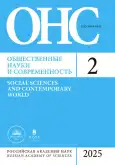Political cooptation: conceptual framework and applicability to Russian politics
- 作者: Gorokhov A.V.1
-
隶属关系:
- National Research University «Higher School of Economics»
- 期: 编号 2 (2025)
- 页面: 128–136
- 栏目: Rostrum of a Young Scientist
- URL: https://journals.eco-vector.com/0869-0499/article/view/687981
- DOI: https://doi.org/10.31857/S0869049925020106
- EDN: https://elibrary.ru/JAYQND
- ID: 687981
如何引用文章
详细
The article considers the main approaches to understanding the concept of cooptation, their evolution, and the possibility of application to the analysis of Russian politics. The study aims to identify the distinctive features of political cooptation in Russian politics. It has been established that the concept is associated with economic and sociological approaches, the main features of political cooptation have been identified: its perception through the prism of interaction between elites, the negative and unequal subtext of interaction, its use to reduce the costs of power, and as a tool for analyzing political regimes. Cooptation in Russian politics has a number of specific features. These are its institutional nature, emphasis on systemic opposition, and great attention to regional political processes.
全文:
作者简介
Alexander Gorokhov
National Research University «Higher School of Economics»
编辑信件的主要联系方式.
Email: agorokhov@hse.ru
ORCID iD: 0000-0002-3118-9403
PhD student of the Faculty of Social Sciences
俄罗斯联邦, 101000, 20, Myasnitskaya st., Moscow参考
- Панов П.В., Сулимов К.А. (2021) Партия власти и системная оппозиция в Государственной думе: конвергенция публичной риторики // Ars Administrandi (Искусство управления). Т. 13. № 4. С. 516–535. https://doi.org/10.17072/2218-9173-2021-4-516-535/ Panov P., Sulimov K. (2021) The ruling party and the systemic opposition in the State Duma: convergence of public rhetoric. Ars Administrandi, vol. 13, no. 4, pp. 516–535. https://doi.org/10.17072/2218-9173-2021-4-516-535. (In Russ.)
- Туровский Р.Ф. (2007) Центр и регионы: проблемы политических отношений. М.: ГУ ВШЭ. 345 c./Turovsky R. (2007) Centr i regiony: problemy politicheskih otnoshenij [Centre and Regions: Problems of Political Relations]. Moscow: Vishaya shkola economiki. 345 p. (In Russ.)
- Туровский Р.Ф., Сухова М.С. (2021) Кооптация оппозиции в региональных парламентах России: игра с нарушением правил // Полития. № 2 (101). C. 121–143. https://doi.org/10.30570/2078-5089-2021-101-2-121-143/ Turovsky R., Sukhova M. (2021) Cooptation of Opposition in Russian Regional Parliaments: Game That Breaks Rules. Politeia, no. 2, pp. 121–143. https://doi.org/10.30570/2078-5089-2021-101-2-121-143. (In Russ.)
- Allen M.P. (1974). The Structure of Interorganizational Elite Cooptation: Interlocking Corporate Directorates. American Sociological Review, vol. 39, no. 3, pp. 393–406.
- Battilana J., Casciaro T. (2013). Overcoming Resistance to Organizational Change: Strong Ties and Affective Cooptation. Management Science, vol. 59, no. 4, pp. 819–836.
- Bengtsson B., Hertting N. (2014) Generalization by mechanism: Thin rationality and ideal-type analysis in case study research. Philosophy of the Social Sciences, vol. 44, no. 6, pp. 707–732.
- Coy P., Hedeen T. (2005) A stage model of social movement co-optation: Community mediation in the United States. The Sociological Quarterly, vol. 46, no. 3, pp. 405–435.
- Dollbaum J. (2017) Curbing Protest through Elite Co-optation? Regional Protest Mobilization by the Russian Systemic Opposition during the «For Fair Elections» Protests 2011–2012. Journal of Eurasian Studies, vol. 8, no. 2, pp. 109–122.
- Donno D. (2013) Elections and democratization in authoritarian regimes. American Journal of Political Science, vol. 57, no. 3, pp. 703–716.
- Evan W. (1966) The Organization Set: Towards a Theory of Interorganizational Relations. In: Approaches in Organization Design. Ed: Thompson J. Pittsburg: Pittsburg University Press. Pp. 173–191.
- Frantz E., Kendall-Taylor A. (2014). A Dictator’s Toolkit: Understanding How Co-optation affects Repression in Autocracies. Journal of Peace Research, vol. 51, no. 3, pp. 332–346.
- Gandhi J. (2008) Political Institutions under Dictatorship. New York: Cambridge University Press. 256 р.
- Gandhi J., Przeworski A. (2006) Cooperation, Cooptation, and Rebellion under Dictatorships. Economics and Politics, vol. 18, no. 1, pp. 1–26.
- Geddes B. (2005) Why Parties and Elections in Authoritarian Regimes? Annual Meeting of the American Political Science Association. Pp. 456–471.
- Golosov G.V. (2014) Co-optation in the Process of Dominant Party System Building: The Case of Russia. East European Politics, vol. 30, no. 2, pp. 271–285.
- Hathaway W., Meyer D.S. (1993) Competition and Cooperation in Social Movement Coalitions: Lobbying for Peace in the 1980s. Berkeley Journal of Sociology, vol. 38, pp. 157–183.
- Holdo M. (2019) Cooptation and non-cooptation: elite strategies in response to social protest. Social Movement Studies, vol. 18, no. 4, pp. 444–462.
- Kavasoglu B. (2022) Opposition party organizational features, ideological orientations, and elite co-optation in electoral autocracies. Democratization, vol. 29, no. 4, pp. 634–654.
- Lapegna P. (2014) Global Ethnography and Genetically Modified Crops in Argentina: On Adoptions, Resistances, and Adaptations. Journal of Contemporary Ethnography, vol. 43, no. 2, pp. 202–227.
- Malesky E., Schuler P. (2010) Nodding vs Needling: Analyzing Delegate Responsiveness in an Authoritarian Parliament. American Political Science Review, vol. 104, no. 3, pp. 482–502.
- Oyugi W. (2006). Coalition Politics and Coalition Governments in Africa. Journal of Contemporary African Studies, vol. 24, no. 1, pp. 53–79.
- Reuter O.J., Robertson G. (2015) Legislatures, Cooptation, and Social Protest in Contemporary Authoritarian Regimes. The Journal of Politics, vol. 77, no. 1, pp. 235–248.
- Reuter O.J., Turovsky R.F. (2014) Dominant Party Rule and Legislative Leadership in Authoritarian Regimes. Party Politics, vol. 20, pp. 663–674.
- Selznick P. (1949) TVA and the Grass Roots: A Study in the Sociology of Formal Organization. Berkeley and Los Angeles: University of California Press. 274 р.
- Thompson J.D., McEwen W. (1958) Organizational goals and environment: goal-setting as an interaction process. American Sociological Review, vol. 23, pp. 23–31.
- Thompson J.D. (2003) Organizations in Action: Social Science Bases of Administrative Theory. New Jersey: Transaction Publishers. 192 р.
补充文件









